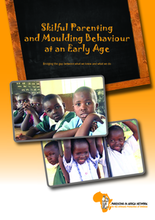This new study by Parenting in Africa Network (PAN) was conducted in three regions in Kenya (Nairobi, Mombasa and Busia), involving primary care givers of children age 0-8 identified though PAN members’ programs, children participating in private and public Early Childhood Development and Education (ECDE) centers, and stakeholders and professionals involved in skillful parenting and early childhood development.
It sought to assess the knowledge gaps and skills among parents and care givers regarding what constitutes skillful parenting, and identify and document their attitudes, and practices in raising children, as well as their understanding of how skillful parenting can positively contribute to behavior change in a child’s formative years. The study employed both quantitative and qualitative research methods, employing a semi-structure coded questionnaire with households, focus group discussions with parents, and stakeholder forums.
The findings of the study showed that although parents have the knowledge of what it means to parent skillfully, only 26% of the respondents considered parenting skills as vital prior to having a child. Findings also indicated that parents identified provision of basic needs, such as health, nutrition, and education as the most important aspects of good parenting. Only a small number (13%) identified a warm loving relationship as necessary for optimal child growth and character formation. Moreover, the study found that mothers were regarded as bearing the greatest responsibility in parenting but in their absence, an extended family member or a teacher were preferred to the father. In addition, although family meetings were identified as a means of ensuring interaction between parents and children (59%) that could strengthen family relationships, the study found that these meetings were not frequently or regularly held.
Most families in the study did not rely on public media information on how to raise children but instead identified family members and religious fora as the best avenues for learning and sharing parenting tips. Furthermore, the study found that ECD centers provided preparatory educational services but had yet to offer services to support parenting during the formative period of child development. ECD services in Kenya are also not supported by the government and, as a result, families unable to afford the fees are missing out on this crucial support. The report concludes its findings by suggesting policy recommendations that include improving ECD centers so that they integrate parenting skills, information or education services necessary to strengthen families and support their needs.
©ICS Africa

